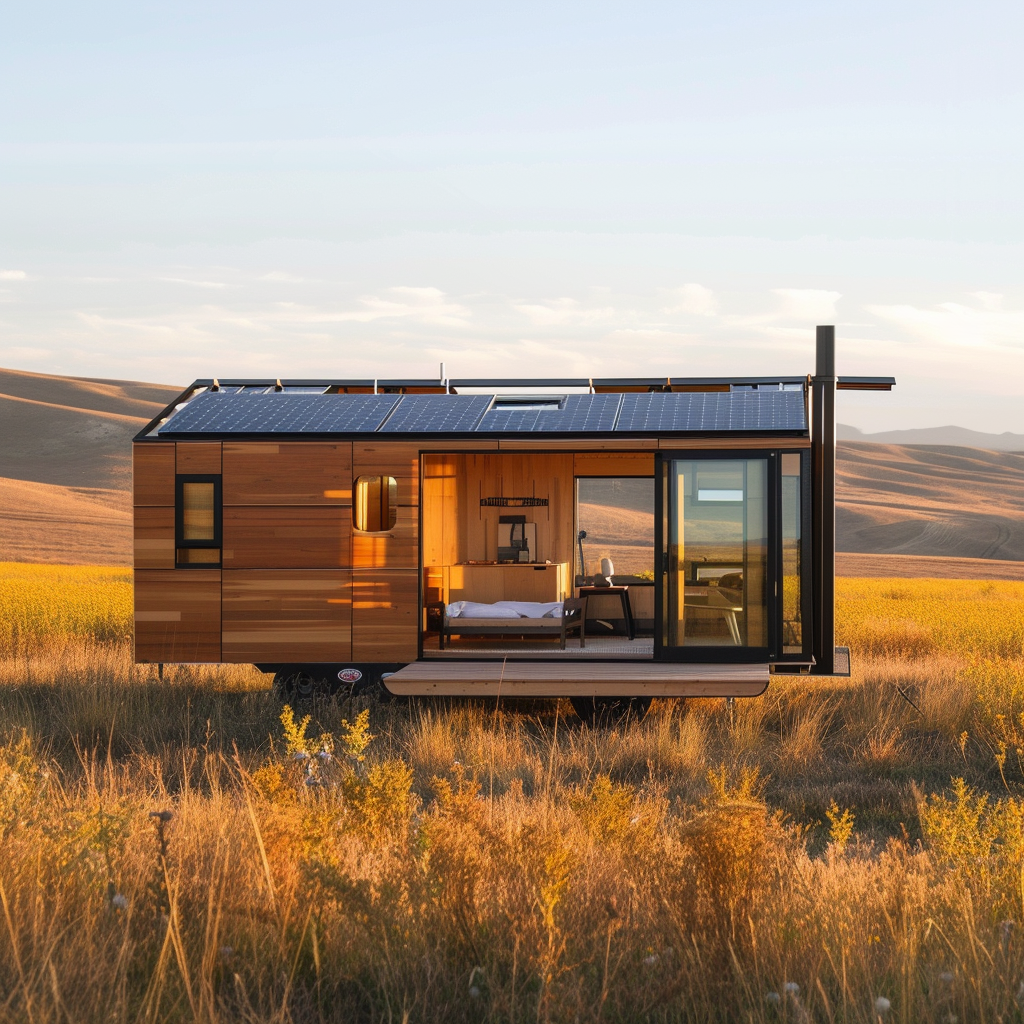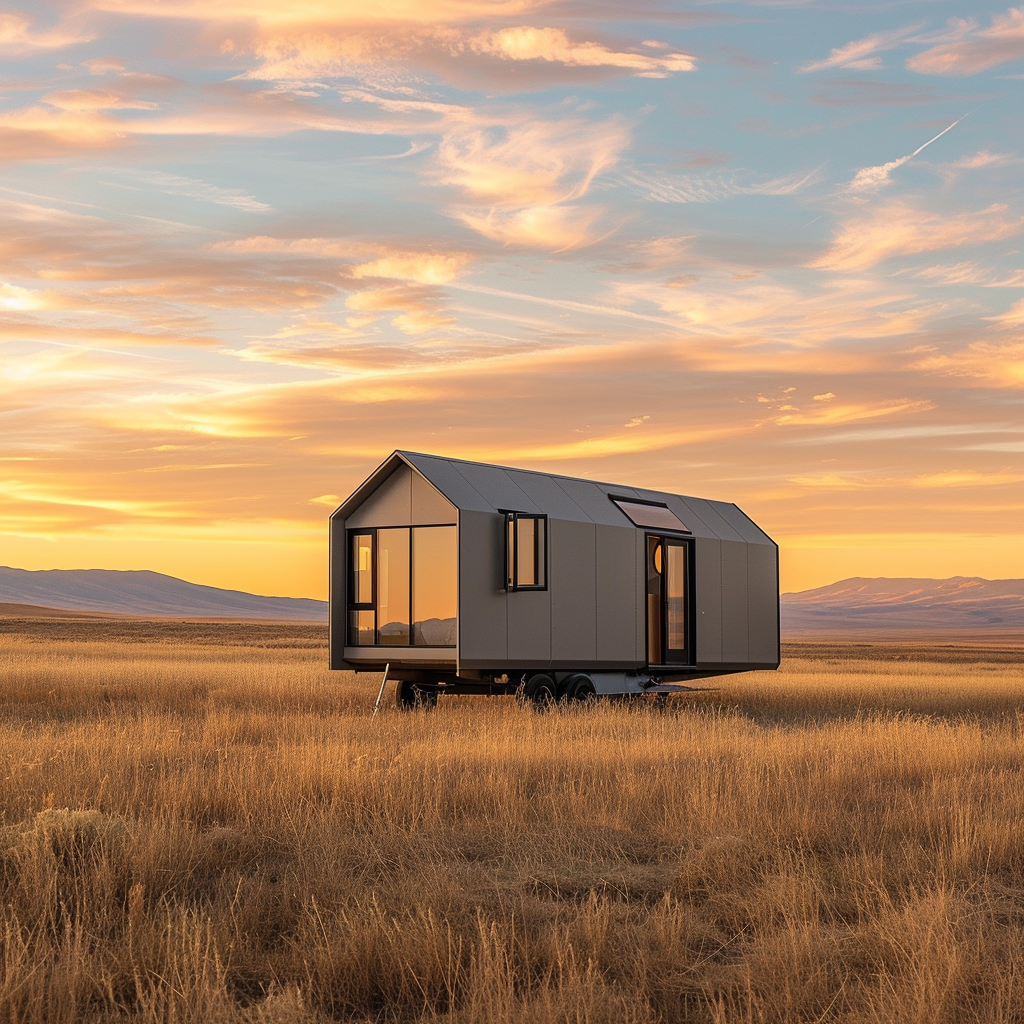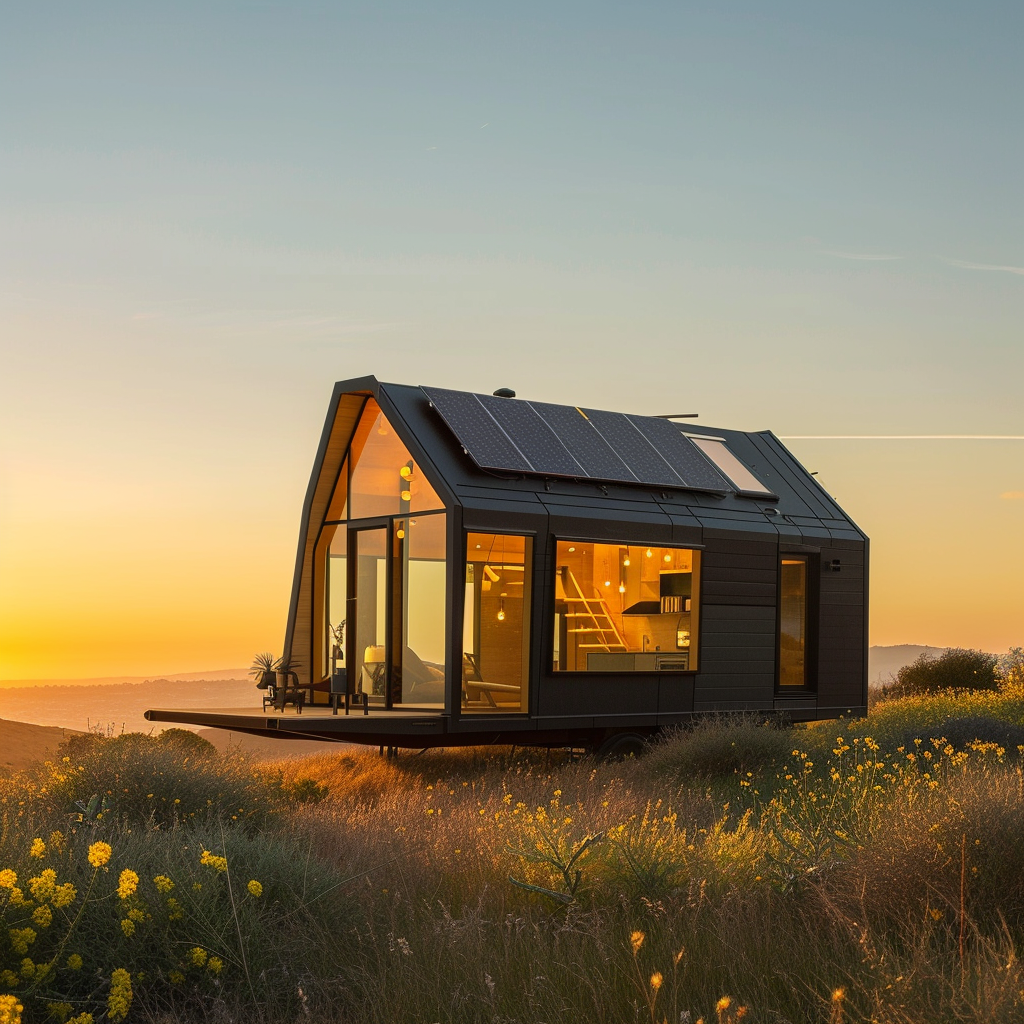In today’s fast-paced world, the idea of living off the grid is becoming increasingly attractive to many people. With the rising cost of traditional homes and a growing awareness of the impact we have on the environment, more individuals are seeking alternative living options. Enter portable off-grid homes, the latest trend in sustainable living. These compact, self-sufficient dwellings offer the freedom to move around while minimizing our reliance on traditional utilities. Whether you’re a minimalist enthusiast or simply looking for a more eco-conscious lifestyle, portable off-grid homes provide a unique and exciting solution to the housing needs of the future. Let´s dive deeper into why portable off-grid homes are becoming a trend right now.
What is off-grid living?
Definition of off-grid living
Off-grid living refers to a lifestyle in which individuals or communities are not reliant on public utilities and instead generate their own power and meet their own water and food needs independently. This means living in a self-sustaining manner, without connecting to the electrical grid, water supply, and sewage systems that are commonly provided by municipalities.
Benefits of off-grid living
There are several benefits to embracing an off-grid lifestyle. Firstly, it offers independence from the traditional utility systems, reducing reliance on external providers and potential disruptions or rising costs. Off-grid living also encourages self-sufficiency and sustainability by utilizing renewable energy sources and efficiently managing resources. Additionally, it can provide an opportunity to reconnect with nature and reduce one’s carbon footprint. Overall, off-grid living promotes a sense of freedom, environmental consciousness, and personal empowerment.
Challenges of off-grid living
While there are numerous advantages to living off the grid, it also presents certain challenges. Off-grid living typically requires significant upfront costs to establish the necessary infrastructure, such as solar panels, rainwater harvesting systems, and waste management solutions. Additionally, maintaining these systems and ensuring reliable access to power, water, and heating can be more labor-intensive and require technical proficiency. Furthermore, adapting to a lifestyle with limited access to modern amenities and conveniences can pose a challenge for some individuals, especially those who are accustomed to a more urban lifestyle. However, with careful planning and a willingness to embrace a simpler way of living, these challenges can be overcome.
Introduction to portable off-grid homes
Definition of portable off-grid homes
Portable off-grid homes, also known as mobile or transportable off-grid homes, are dwellings that can be moved from one location to another while still maintaining self-sufficiency. These homes extend the concept of off-grid living by offering flexibility and mobility, allowing individuals or communities to live off-grid in various locations without sacrificing the comforts and conveniences of a traditional home.
Advantages of portable off-grid homes
Portable off-grid homes provide several advantages over conventional off-grid living options. One of the key advantages is the ability to relocate easily. Whether it’s to explore different landscapes, escape unfavorable weather conditions, or experience new communities, portable homes offer the freedom to move without losing the self-sufficiency and sustainability that off-grid living provides. Additionally, these homes allow for multiple usage scenarios, such as using them as vacation homes, guest houses, or even as temporary shelters in emergency situations. They can also be customized to suit individual preferences and needs.
Key features of portable off-grid homes
Portable off-grid homes incorporate innovative design elements and technologies to enable self-sufficiency and mobility. They often utilize renewable energy sources like solar panels or wind turbines to generate electricity. Some portable homes are equipped with rainwater collection and filtration systems, enabling residents to have a reliable water supply regardless of their location. These homes may also incorporate composting toilets, greywater recycling systems, and efficient insulation to minimize waste and reduce environmental impact. Furthermore, modern advances in construction materials and technology have made it possible to create portable homes that are both durable and lightweight, making transportation and setup easier.

Increasing demand for portable off-grid homes
Changing lifestyle preferences
The increasing demand for portable off-grid homes can be attributed in part to changing lifestyle preferences. Many individuals are seeking a simpler and more sustainable way of life, opting for experiences over material possessions. The ability to live off-grid and travel to different locations resonates with those who value adventure, exploration, and a sense of freedom. Portable off-grid homes offer the opportunity to immerse oneself in nature while still enjoying the comforts of a home, catering to the growing desire for a balanced and intentional lifestyle.
Rising awareness of environmental impact
Another factor driving the demand for portable off-grid homes is the rising awareness of the environmental impact of conventional living. People are becoming more conscious of their carbon footprint and desire to reduce their impact on the planet. Portable off-grid homes, with their utilization of renewable energy sources and minimal reliance on traditional utilities, offer an eco-friendly alternative. By living off-grid, individuals can significantly reduce their energy consumption and contribute to a more sustainable future.
Desire for mobility and adaptability
In today’s fast-paced world, there is a growing desire for mobility and adaptability. Many individuals wish to be able to change their living environment easily, whether it’s to pursue job opportunities, follow personal passions, or simply explore different regions. Portable off-grid homes provide the flexibility to live in various locations without sacrificing the comforts and conveniences of a traditional home. This desire for mobility and adaptability, coupled with the appeal of off-grid living, makes portable off-grid homes an attractive choice for many.
Cost-effectiveness of portable off-grid homes
Lower upfront costs
One of the primary advantages of portable off-grid homes is lower upfront costs compared to traditional homes. The construction of a portable off-grid home typically involves less material and labor, resulting in a more affordable initial investment. Additionally, portable homes often require less land compared to traditional homes, further reducing costs. This affordability makes off-grid living accessible to a wider range of individuals, including those with limited financial resources.
Reduced utility bills
Living off the grid with a portable home eliminates the need for traditional utility services, such as electricity, water, and sewage. This leads to substantial savings on monthly utility bills, which can be a significant financial relief over time. Portable off-grid homes typically rely on renewable energy sources like solar or wind power, allowing residents to generate their electricity for free. Water is often sourced from rainwater collection systems, reducing the need for conventional water supplies. By minimizing or eliminating ongoing utility expenses, portable off-grid homes offer enhanced financial sustainability.
Opportunities for self-sufficiency
Portable off-grid homes promote self-sufficiency by providing opportunities for residents to grow their food, manage their waste, and effectively utilize available resources. Many portable homes incorporate features like rooftop gardens or vertical farming systems, allowing residents to cultivate their fresh produce and reduce grocery expenses. Composting toilets and greywater recycling systems enable the efficient management of waste, minimizing reliance on external sewage infrastructure. By embracing self-sufficiency, residents of portable off-grid homes can further reduce their expenses and enhance their independence.
Sustainability and eco-friendly benefits
Utilization of renewable energy sources
Portable off-grid homes are designed to maximize the use of renewable energy sources like solar or wind power. This enables residents to generate their electricity without relying on fossil fuel-based energy grids, reducing their carbon footprint and minimizing their impact on the environment. By utilizing these renewable energy sources, portable off-grid homes contribute to the global shift towards cleaner and more sustainable energy generation.
Reduced carbon footprint
Living off the grid inherently reduces one’s carbon footprint. Portable off-grid homes take this a step further by being designed with sustainability in mind. These homes often incorporate energy-efficient appliances, LED lighting, and advanced insulation to minimize energy consumption. Additionally, with their reliance on renewable energy sources, portable homes reduce greenhouse gas emissions associated with traditional utility services. By embracing a portable off-grid lifestyle, individuals can significantly reduce their environmental impact and live in harmony with nature.
Efficient use of resources
Portable off-grid homes encourage the efficient use of resources by incorporating water-saving fixtures, efficient insulation, and waste management systems. Rainwater collection and filtration systems ensure a reliable water supply while reducing reliance on water-intensive municipal sources. Advanced insulation materials help regulate temperature and minimize energy requirements for heating or cooling. Additionally, composting toilets and greywater recycling systems minimize water waste and optimize the use of organic waste. These resource-efficiency measures promote sustainable living practices and contribute to a more ecologically conscious way of life.
Versatility and mobility
Ability to relocate easily
One of the significant advantages of portable off-grid homes is their ability to be relocated easily. Whether it’s a desire to explore different landscapes, the need to relocate for work or personal reasons, or simply the urge for a change of scenery, portable homes allow individuals to take their self-sufficient lifestyle with them wherever they go. The ability to relocate without sacrificing the comforts and conveniences of home is a key benefit for those seeking a nomadic or flexible lifestyle.
Multiple usage scenarios
Portable off-grid homes are not limited to a single purpose or location. They can serve as primary residences, vacation homes, guest houses, or even emergency shelters. The flexibility in usage scenarios makes these homes appealing to individuals with varying needs and lifestyles. For example, those who love outdoor activities may choose to use their portable home as a base for camping or exploring different wilderness areas. Others may opt to use it as a vacation home, allowing them to escape to their preferred locations without the expense or hassle of traditional accommodation options.
Flexibility in design and customization
Portable off-grid homes offer a high level of flexibility in design and customization. They can be tailored to suit individual preferences and requirements, ranging from minimalist designs to more luxurious and spacious layouts. The compact nature of portable homes often encourages creative use of space, with smart storage solutions and multi-functional furniture. This flexibility in design allows individuals to personalize their living space and create a home that reflects their unique style and needs.
Technological advancements and innovations
Improved energy storage solutions
Technological advancements have significantly improved energy storage solutions, making off-grid living more practical and convenient. Portable off-grid homes can now utilize advanced battery technologies, such as lithium-ion batteries, that store surplus energy generated from renewable sources. These batteries can power the home during periods of low energy generation, such as at night or during inclement weather. Improved energy storage solutions ensure a reliable and consistent power supply, making off-grid living more feasible and hassle-free.
Smart home automation
The integration of smart home automation systems into portable off-grid homes has transformed the way these homes are managed and operated. Smart home technology allows residents to monitor and control various aspects of their home remotely, optimizing energy usage and enhancing convenience. From controlling lighting and temperature to managing security systems and appliances, smart home automation ensures efficient resource use and enhances the overall living experience. By implementing these technologies, portable off-grid homes can seamlessly blend modern comforts with sustainable living practices.
Innovative insulation and energy efficiency
Innovations in insulation and energy efficiency have greatly improved the performance of portable off-grid homes. Advanced insulation materials help regulate temperature, minimizing heat loss in colder climates and reducing the need for extensive heating or cooling systems. Additionally, the use of energy-efficient appliances and LED lighting further reduces energy consumption. These innovations allow portable off-grid homes to maintain a comfortable living environment while optimizing resource usage and minimizing energy wastage.

Promotion of minimalist and clutter-free lifestyle
Limited space encourages decluttering
Portable off-grid homes often feature limited space in comparison to conventional homes. This limitation promotes a minimalist and clutter-free lifestyle. With limited storage and living areas, residents are encouraged to prioritize essential items and eliminate unnecessary possessions. This shift towards a minimalist lifestyle can be both liberating and fulfilling, as it allows individuals to focus on what truly matters and cultivate a sense of simplicity and order.
Promotion of essentialism
Living in a portable off-grid home fosters a sense of essentialism, focusing on what is necessary and valuable rather than excess material possessions. With limited space, individuals are prompted to consider their needs versus wants, cultivating a more intentional and mindful approach to consumption. By adopting an essentialist mindset, residents of portable off-grid homes can experience increased mental clarity, reduced stress, and a deeper appreciation for the things that truly bring them joy and fulfillment.
Enhanced focus on experiences over material possessions
Portable off-grid homes provide an opportunity to prioritize experiences over material possessions. With the freedom to move and explore different locations, individuals can invest their time and resources into creating meaningful memories and adventures rather than acquiring material goods. The limited space of a portable home encourages residents to spend more time outdoors, embrace nature, and engage in activities that promote personal growth and well-being. This focus on experiences over material possessions enhances overall life satisfaction and enriches the off-grid living experience.
Community and networking opportunities
Emergence of off-grid communities
The growing interest in portable off-grid homes has led to the emergence of off-grid communities. These communities consist of like-minded individuals or families who embrace the off-grid lifestyle and are drawn to the freedom and sustainability it offers. Off-grid communities provide a supportive network where residents can share knowledge, resources, and experiences. Living in an off-grid community allows individuals to connect with others who share similar values and goals, fostering a sense of belonging and creating opportunities for collaboration and mutual support.
Shared knowledge and resources
In off-grid communities, there is a culture of sharing knowledge and resources. Residents often exchange ideas, solutions, and strategies related to energy generation, sustainable living practices, and self-sufficiency. This sharing of knowledge and experiences empowers community members to continuously learn and improve their off-grid lifestyles. From troubleshooting technical issues to optimizing resource management, the collective wisdom of the community enables residents to overcome challenges and thrive in their sustainable and independent way of life.
Supportive networks and like-minded individuals
Joining a community of like-minded individuals in a portable off-grid lifestyle provides a built-in support system. These networks offer emotional support, camaraderie, and valuable connections. Whether it’s lending a helping hand during the process of relocating a portable home or providing advice on off-grid living challenges, the support of a community can significantly enhance the off-grid experience. The ability to connect with others who share similar values and goals can foster long-lasting friendships and create a supportive social environment.
Potential challenges and limitations
Initial investment and financing
One of the potential challenges of portable off-grid homes is the initial investment required to set up the necessary infrastructure. While portable homes themselves may be more affordable than traditional homes, the cost of solar panels, batteries, rainwater collection systems, and other off-grid essentials can be significant. Financing options for off-grid homes may be limited compared to conventional mortgages, making it more challenging for some individuals to pursue this lifestyle. However, as the demand for off-grid living grows, it is likely that more financial institutions will offer specialized financing options to meet the needs of those seeking portable off-grid homes.
Limited size and space restrictions
The compact nature of portable off-grid homes can present limitations in terms of living space. Accommodating larger families or individuals who require a significant amount of personal space may be challenging. The need to optimize storage and minimize possessions can also be a significant adjustment for those accustomed to more extensive living arrangements. However, with careful planning and creative design, portable homes can still provide functional and comfortable living spaces that meet the needs of individuals or smaller families.
Regulatory and legal considerations
Living in a portable off-grid home may present regulatory and legal considerations. Zoning regulations and building codes can vary from one location to another, and not all municipalities may permit the establishment of portable homes as permanent residences. In some cases, permits or special considerations may be required to legally live in a portable off-grid home. It is essential for individuals considering this lifestyle to research and understand the local regulations and seek appropriate advice to ensure compliance with all relevant laws and regulations.
In conclusion, portable off-grid homes offer a unique and enticing alternative to conventional living. They provide individuals and communities with the opportunity to embrace a sustainable, self-sufficient, and versatile lifestyle. The increasing demand for portable off-grid homes can be attributed to changing lifestyle preferences, rising environmental consciousness, and the desire for mobility and adaptability.
The cost-effectiveness, sustainability, and technological advancements associated with portable off-grid homes make them an attractive choice for those seeking a more intentional and eco-friendly way of living. While there are some challenges and limitations, the benefits and opportunities offered by portable off-grid homes far outweigh these considerations. By embracing this lifestyle, individuals can create homes and communities that align with their values, foster a sense of connection with nature, and contribute to a more sustainable future.




